FEATURED ARTICLES [Latest news updates]
 How that cork in your wine bottle helps forests and biodiversity, an interview with Patrick Spencer
How that cork in your wine bottle helps forests and biodiversity, an interview with Patrick Spencer
(02/28/2010) Next time you're in the supermarket looking to buy a nice bottle of wine: think cork. Although it’s not widely known, the cork industry is helping to sustain one of the world’s most biodiverse forests, including a number of endangered species such as the Iberian lynx and the Barbary deer. Spreading across 6.6 million acres in southern Europe (France, Spain, Portugal, and Italy) and northern Africa (Algeria, Morocco, and Tunisia) oak cork trees Quercus suber are actually preserved and protected by the industry.
 James Inhofe is not a climatologist: a journalist's perspective
James Inhofe is not a climatologist: a journalist's perspective
(02/25/2010) As a child when I came down with pneumonia my parents did not rush me to see a policeman, a cattle rancher, or a local businessman. Instead they took me to see a medical doctor—someone who had studied that science for at least twelve years—and I was quickly given injections and put on antibiotics. Thanks to my parents' ability to tell the difference between experts and non-experts, I survived.
 Even megafauna can be quickly forgotten: the baiji and shifting baselines
Even megafauna can be quickly forgotten: the baiji and shifting baselines
(02/23/2010) In 2006 a survey in China to locate the endangered Yangtze River dolphin, known as the baiji, found no evidence of its survival. Despondent, researchers declared that the baiji was likely extinct. Four years later and the large charismatic marine mammal is not only 'likely extinct', but in danger of being forgotten, according to a surprising new study "Rapidly Shifting Baselines in Yangtze Fishing Communities and Local Memory of Extinct Species" in Conservation Biology. Lead author of the study, Dr. Samuel Turvey, was a member of the original expedition in 2006. He returned to the Yangtze in 2008 to interview locals about their knowledge of the baiji and other vanishing megafauna in the river, including the Chinese paddlefish, one of the world's largest freshwater fish. In these interviews Turvey and his team found clear evidence of 'shifting baselines': where humans lose track of even large changes to their environment, such as the loss of a top predator like the baiji.
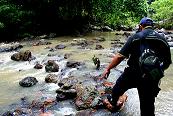 Where two worlds collide: visiting Tabin Wildlife Reserve
Where two worlds collide: visiting Tabin Wildlife Reserve
(02/21/2010) The vehicle stopped on the way into Tabin Wildlife Reserve as a troupe of pig-tailed macaques began making their way across the road. In a flash a domestic dog, which may or may not have been 'ownerless', ambushed the group. Chaos erupted as the big predator fell upon the community. As quickly as it began it was all over and the dog was rushing over with an infant monkey in its mouth, leaving the macaques' screeching out their helplessness. As my uncustomary welcome to Tabin Wildlife Reserve shows: the park is a meeting of two worlds. On the left side of the road leading into the reserve is a massive oil palm plantation, on the right is the rainforest and the many species the reserve protects. Tabin, therefore, gives the visitor a unique up-close view of the debate raging in Borneo and throughout much of Southeast Asia over conservation and environment versus oil palm plantations.
 The Critically Endangered South China Tiger Roars Again in 2010, the Chinese Year of the Tiger
The Critically Endangered South China Tiger Roars Again in 2010, the Chinese Year of the Tiger
(02/14/2010) Today marks the Chinese New Year for 2010, and the start of the traditional Year of the Tiger. The people of China might be celebrating future Years of the Tigers without their native and critically endangered South China Tiger (Panthera tigris amoyensis) if not for the efforts of Save China's Tigers (SCT) a grassroots conservation effort headed by the charismatic Li Quan and her husband Stuart Bray. Both Ms Quan and Mr. Bray are former senior executives in international business circles. After leaving the corporate world, Ms Quan and Mr. Bray are now stepping up as champions for China's natural environment, much of which has been lost in the Chinese march towards "The Four Modernizations."
 A proposal to end Madagascar's logging crisis
A proposal to end Madagascar's logging crisis
(02/10/2010) In the aftermath of a military coup last March, Madagascar's rainforests have been pillaged for precious hardwoods, including rosewood and ebonies. Tens of thousands of hectares have been affected, including some of the island's most biologically-diverse national parks: Marojejy, Masoala, and Makira. Illegal logging has also spurred the rise of a commercial bushmeat trade. Hunters are now slaughtering rare and gentle lemurs for restaurants.
 Forest conservation in U.S. climate policy: an interview with Jeff Horowitz
Forest conservation in U.S. climate policy: an interview with Jeff Horowitz
(02/05/2010) The Copenhagen Accord signed in December is widely seen as a disappointment. The Accord set no binding targets for greenhouse gas emissions targets and did not even commitment to a legally binding treaty in the future. Serious work is needed to bring the process back on track. But some progress was made. Countries agreed on international monitoring of emissions (a point of conflict between China and the United States) and funding (rich countries pledged $3 billion a year for the next three years and up to $100 billion a year by 2020) for mitigation and adaptation in developing countries. Furthermore, there were gains for the REDD mechanism, a U.N.-backed plan to compensate developing countries for reducing emissions from deforestation and degradation.
 Why top predators matter: an in-depth look at new research
Why top predators matter: an in-depth look at new research
(02/02/2010) Few species have faced such vitriolic hatred from humans as the world's top predators. Considered by many as pests—often as dangerous—they have been gunned down, poisoned, speared, 'finned', and decimated across their habitats. Even where large areas of habitat are protected, the one thing that is often missing are top predators. However, new research over the past few decades is showing just how vital these predators are to ecosystems. Biologists have long known that predators control populations of prey animals, but new studies show that they may do much more. From controlling smaller predators to protecting river banks from erosion to providing nutrient hotspots, it appears that top predators are indispensable to a working ecosystem. Top predators sit at the apex of an ecosystem's food chain. Wolves in Alaska, tigers in Siberia, lions in Kenya, white sharks in the Pacific are all examples of top predators.
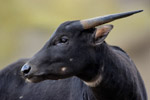 Tales From A Frozen Zoo
Tales From A Frozen Zoo
(02/02/2010) A "frozen zoo" is a cryonic or "cold storage" facility for the long term preservation of animal and plant genetic material such as skin cells, DNA, sperm, eggs, and embryos. The first facility of this type was developed by San Diego Zoological Society for the study and preservation of genetic material from endangered animal species from across the globe. The following article is a dialog with Dr. Oliver Ryder, Director of Genetics at the San Diego Zoological Society's Institute for Conservation Research, home of the San Diego Zoo's genetics collection. This piece is intended to read as both an interview and a series of vignettes on the background, goals, and highlights of the San Diego Zoo's genetics collection or "Frozen Zoo"
 Stopping wildlife trafficking in Congo
Stopping wildlife trafficking in Congo
(02/01/2010) The bushmeat trade in the Congo basin has been widely publicized but poorly addressed. While fines and sentences exist for wildlife trafficking, they have traditionally been poorly enforced due to corruption, poor governance, and attentions focused on other priorities. Major traffickers, who tend to be rich and well-connected, trade with impunity, knowing that a well-placed bribe or a phone call can get them off with little more than a slap on a wrist. But the days of privilege may be drawing to a close in Republic of Congo thanks to the efforts of PALF [Projet d'Appui à l'Application de la Loi sur la Faune], a Brazzaville-based NGO which is working to build the capacity of Congolese authorities to enforce wildlife laws. In the process, PALF is helping root out corruption and raise awareness of the plight of the country's increasingly threatened wildlife, including forest elephants, big cats, chimps, and gorillas.
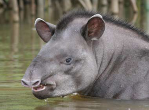 Guyana bans gold mining in the 'Land of the Giants'
Guyana bans gold mining in the 'Land of the Giants'
(02/28/2010) Guyana has banned gold dredging in the Rewa Head region after an expedition turned up unspoiled wilderness and mind-boggling biodiversity. The researchers, in just six weeks, stumbled on the world's largest snake (anaconda), spider (the aptly named goliath bird-eating spider), armadillo (the giant armadillo), anteater (the giant anteater), and otter (the giant otter), leading them to dub the area 'the Land of the Giants'.
Photos: Giant iceberg breaks off Antarctica
(02/26/2010) An iceberg the size of Luxembourg broke off from Antarctica after it was hit by another iceberg, reports Reuters. The separation could impact ocean circulation and affect marine life say researchers.
Cargill sells palm oil business in Papua New Guinea
(02/26/2010) Cargill will sell off its palm oil holdings in Papua New Guinea (PNG) to focus on operations in Indonesia, reports the Star Tribune. The $175 million sale involves 62,000 ha of oil palm across three plantations and several mills.
UN to appoint independent board to audit the IPCC
(02/26/2010) The U.N. will appoint an independent board of scientists to review the Intergovernmental Panel on Climate Change (IPCC), the embattled U.N. climate body charged with evaluating the risk of climate change caused by human activity, reports Reuters.
 French company prepares to ship illegally logged rainforest wood from Madagascar
French company prepares to ship illegally logged rainforest wood from Madagascar
(02/26/2010) Delmas, a French shipping company that has been under pressure for facilitating the destruction of Madagascar's rainforest parks, has been cleared to begin picking up contraband rosewood as soon as Monday, report local sources in the Indian Ocean island nation. Leaders behind last year's military coup — which displaced the autocratic, but democratically elected President Marc Ravalomanana — have signed off on the shipment.
Savior of endangered crocodiles dies of malaria
(02/25/2010) Crocodile-expert and conservationist, Dr. John Thorbjarnarson, died of falciparum malaria in India on February 14th at the age of fifty-two. While many conservationists work with publicly popular animals like tigers and whales, Thorbjarnarson’s passion was for crocodiles. A Senior Conservation Scientist with the Wildlife Conservation Society (WCS), Thorbjarnarson proved instrumental in saving both the Orinoco crocodile and the Chinese crocodile from extinction.
Galapagos fur seals exploit warmer waters to establish colony off Peru
(02/25/2010) As suggested by their name, the Galapagos fur seals were once endemic to the Galapagos island chain off the coast of Ecuador. But in a warming world species are on the move, and the Galapagos fur seal is no exception. According to a recent story in Reuters the Galapagos fur seals have established what appears to be a permanent colony off the coast of Peru, 900 miles from their home.
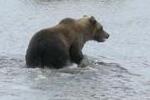 Grizzly bears move into polar bear territory, threatening polar cubs
Grizzly bears move into polar bear territory, threatening polar cubs
(02/24/2010) Two of the world's largest land carnivores are converging on the same territory, according to data recently published in Canadian Field Naturalist. Grizzly bears ( Ursus arctos horribilis) are moving into an area that has long been considered prime polar bear habitat in Manitoba, Canada. Although polar bears (Ursus maritimus) are bigger than their grizzly relatives—they are the world's largest land carnivores—biologists are concerned that grizzlies will kill polar cubs, further threatening the polar bear, which is already thought to be imperiled by ice loss in the Arctic.
 Vietnam implements project to save one of the world's rarest mammals, the shy soala
Vietnam implements project to save one of the world's rarest mammals, the shy soala
(02/24/2010) Vietnam's central province of Thua Thien-Hue has approved a project to save the enigmatic saola. Listed as Critically Endangered, the saola (Pseudoryx nghetinhensis)—a type of forest antelope—is so rare and secretive that it was only discovered in 1992. It is considered by many to be one of the world's rarest mammals.
BBC documentary leads Unilever to blacklist Indonesian palm oil company
(02/24/2010) Unilever has told Indonesian suppliers to stop sourcing palm oil from Duta Palma due to concerns over deforestation, reports Reuters.
Climate change melting southern Antarctic Peninsula ice shelves
(02/23/2010) The US Geological Survey (USGS) has found that every ice front in the southern part of the Antarctic Peninsula—the coldest part—has been retreating overall for the past sixty years with the greatest changes visible since 1990.
Local vegetation can point to the consequences of climate change, Israeli scientists say after extensive studies
(02/23/2010) A recent study by a team of researchers from Bar Ilan University suggests that endangered plants in water-saturated habitats can be taken as indicators for climate change in the Levant region. They present a picture particularly of the consequences of changes in precipitation.
Conflicting signals out of Indonesia on whether palm oil plantations will be classified as forests
(02/23/2010) Indonesia will not allow the conversion of natural forest for oil palm plantations, claimed the country's Forestry Minister Zulkifli Hasan in comments reported by the Jakarta Post.
Could toxins from plantation trees be causing cancer cluster, oyster deaths in Tasmania?
(02/22/2010) A local medical doctor, a marine ecologist, and oyster farmers are raising an alarm that a nearby monoculture plantation of Eucalyptus nitens may be poisoning local water reserves, leading to rare cancers and high oyster mortality in Tasmania. However, the toxin is not from pesticides, as originally expected, but appears to originate from the trees themselves.
With increased protection, Gulf of California marine life could recover
(02/22/2010) The Gulf of California's once rich marine ecosystem is in trouble. Surveys from 1999 and 2009 revealed that during the ten-year-period 60 percent of the areas showed signs of degradation, including the loss of top predators necessary to keep an ecosystem healthy, for example sharks, groupers, and snappers.
 REDD payments may not entice developers over palm oil
REDD payments may not entice developers over palm oil
(02/22/2010) In less than a generation oil palm cultivation has emerged as a leading form of land use in tropical forests, especially in Southeast Asia. Rising global demand for edible oils, coupled with the crop's high yield, has turned palm oil into an economic juggernaut, generating US$ 10 billion in exports for Indonesia and Malaysia, which account for 85 percent of palm oil production, alone. Today more than 40 countries - led by China, India, and Europe - import crude palm oil.
"No change whatsoever" in scientists' conviction that climate change is occurring
(02/22/2010) Despite some politicians and TV personalities claiming that climate change is dead, a panel of influential US and European scientists held a press conference at the annual meeting of the American Association for the Advancement of Science to set the record straight on the state of the science and the recent media frenzy against climate change. "There has been no change in the scientific community, no change whatsoever" in the consensus that globally temperatures are rising, said Gerald North, professor of atmospheric sciences at Texas A&M University. Recent data has shown that the decade from 2000-2009 was the warmest decade on record.
Indonesia to target New Guinea for agricultural expansion
(02/22/2010) Indonesia will target its last frontier — its territory on New Guinea — as it seeks to become a major agricultural exporter, reports the AFP.
Illegal loggers hit community reforestation project in Indonesia, spurring questions about REDD
(02/22/2010) Illegal loggers are targeting community-managed forests in South Sumatra, renewing questions over forestry governance and law enforcement as the Indonesia prepares to capitalize on payments for conservation and reforestation under a proposed climate change mitigation mechanism known as REDD, reports the Jakarta Press.
Cricket mothers warn offspring about spiders before they hatch
(02/21/2010) Cricket mothers are long gone by the time their infants hatch, so one would assume that cricket parents have little effect on their offspring's behavior. Not so, according to a new study in the American Naturalist which proves that mother crickets have the potential to teach their offspring—while still in their eggs—about the hazards of spiders.
Profit of biggest companies would be cut by a third if forced to pay for environmental damage from operations
(02/19/2010) Profits of the world's 3,000 largest companies would be cut by $2.2 trillion per year if they were forced to pay for environmental damage from their operations, according to an upcoming U.N. report detailed by The Guardian. The study, conducted by Trucost, a consultancy, and scheduled to be released this summer, estimates that pollution and degradation of natural resources by the world's 3,000 largest companies amount to six to seven percent of total revenue, or roughly one-third of profits.
 Pregnancy gives new hope for rhino on the brink
Pregnancy gives new hope for rhino on the brink
(02/18/2010) Though they grew up world's apart, Sumatran rhinos Ratu and Andalas have given conservationists new-found hope for saving the embattled species. The rhino couple is expecting, according to the Sumatran Rhino Sanctuary at Way Kambas, Indonesia. One of the world's most endangered big mammals, Sumatran rhinos are unique due to their hairy bodies and small size (at least compared to other rhinos). The last surviving members of the genus Dicerorhinus, only 200 Sumatran rhinos are estimated to survive in the wild. Ratu's pregnancy holds special significance for a number of reasons. It is the first pregnancy at the Sumatran Rhino Sanctuary; it will be both Ratu's and Andalas' first child; it is also the first pregnancy in captivity since Andalas' mother Emi—the only Sumatran rhino to successfully give birth in captivity for 112 years—passed away last fall.
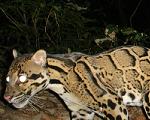 Photos: highest diversity of cats in the world discovered in threatened forest of India
Photos: highest diversity of cats in the world discovered in threatened forest of India
(02/18/2010) Using camera traps over a two year period wildlife biologist Kashmira Kakati has discovered seven species of wild cats living in the same forest: the Jeypore-Dehing lowland forests in the northeastern Indian state of Assam. Yet the cat-crazy ecosystem is currently threatened by deforestation, unsustainable extractive industries, including crude oil and coal, and big hydroelectric projects. Some of the cats are also imperiled by poachers. In light of this discovery, conservationists are calling on the Indian government to protect the vulnerable forest system.
 Humans push half of the world's primates toward extinction, lemurs in particular trouble
Humans push half of the world's primates toward extinction, lemurs in particular trouble
(02/18/2010) Of the known 634 primate species in the world 48 percent are currently threatened with extinction, making mankind's closes relatives one of the most endangered animal groups in the world.. In order to bring awareness to the desperate state of primates, a new report by the International Union for the Conservation of Nature highlights twenty-five primates in the most need of rapid conservation action. Compiled by 85 experts the report, entitled Primates in Peril: The World’s 25 Most Endangered Primates, 2008–2010, includes six primates from Africa, eleven from Asia, three from Central and South America, and five from the island of Madagascar.
UN to protect seven migratory sharks, but Australia opts out
(02/17/2010) One hundred and thirteen countries have signed on to an agreement to protect seven migratory sharks currently threatened with extinction byway of the Convention on the Conservation of Migratory Species of Wild Animals (CMS), according to the UN Environment Program (UNEP). The agreement prohibits hunting, fishing, or deliberate killing of the great white shark, basking shark, whale shark, porbeagle shark, spiny dogfish, as well as the shortfin and longfin mako sharks. However, Australia has declared it will ignore certain protections.
 New study: why plants produce different sized seeds
New study: why plants produce different sized seeds
(02/17/2010) The longstanding belief as to why some plants produce big seeds and others small seeds is that in this case bigger-is-better, since large seeds have a better chance of survival. However, Helene Muller-Landau, staff scientist at the Smithsonian Tropical Research Institute and head of the HSBC Climate Partnership's effort to quantify carbon in tropical forests, grew dissatisfied with that explanation. For example, if big seeds were always the 'right' evolutionary path than why would any plants evolve small seeds? In a new paper in the Proceedings of the National Academy of Sciences, Muller-Landau argues for a more complex explanation involving a trade-off between surviving stressful conditions and taking full advantage when the conditions are just right.
Consumers fail at identifying green companies
(02/17/2010) An article today in New Scientist shows that American consumers have a difficult time correctly identifying green companies, often confusing 'greenwashing' for true green credentials or not bestowing enough credit where credit is truly due. By combining data from Earthsense, which polled 30,000 Americans about on their views of 'green' companies, and Trucost which assesses companies global environmental impact, New Scientist was able to discover just how confused American consumers are when it comes to identifying 'green'.
EU biofuels target will starve the poor, says anti-poverty group
(02/16/2010) The European Union's biofuel targets could starve up to 100 million people, warns a report from an anti-poverty charity. ActionAid estimates the E.U.'s plan to source 10 percent of transport fuels from biofuels would increase competition for agricultural lands, spurring a sharp rise in food prices. Dearer food would disproportionally affect the world's poorest people.
 Under siege: oil and gas concessions cover 41 percent of the Peruvian Amazon
Under siege: oil and gas concessions cover 41 percent of the Peruvian Amazon
(02/16/2010) A new study in the Environmental Research Letter finds that the Peruvian Amazon is being overrun by the oil and gas industries. According to the study 41 percent of the Peruvian Amazon is currently covered by 52 separate oil and gas concessions, nearly six times as much land as was covered in 2003. "We found that more of the Peruvian Amazon has recently been leased to oil and gas companies than at any other time on record," explained co-author Dr. Matt Finer of the Washington DC-based Save America’s Forests in a press release. The concessions even surpass the oil boom in the region during the 1970s and 80s, which resulted in extensive environmental damage.
 Twelve-year-old on a mission to save Africa's most unusual animal, the okapi, an interview with Spencer Tait
Twelve-year-old on a mission to save Africa's most unusual animal, the okapi, an interview with Spencer Tait
(02/16/2010) Anyone who says a kid can't change the world hasn't met Spencer Tait. At the age of five Spencer had his first encounter with the Congo's elusive okapi at the Milwaukee Public Museum. Spencer—now 12 years old—describes that encounter as 'love at first sight'. He explains that while the okapi "looks like a mix between a zebra, horse, and giraffe [...] it's really only related to the giraffe." Seeing the okapi at the museum led Spencer not only to learn all about the okapi, but also to find out what was threatening the animal's survival, including the long civil conflict in the Democratic Republic of Congo, the okapi's home. Most kids—and adults too—would probably leave it at that, but not Spencer.
Australia starts 10 million dollar initiative to find new species
(02/15/2010) Known as the 'Bush Blitz', Australia will spend 10 million Australian dollars (8.88 million US dollars) over the next three years to conduct biodiversity surveys in far-flung places, reports Sydney Morning Herald. The program hopes to both uncover new species and gather more data about innumerable little-known plants and animals on the continent.
Tropical timber imports to the U.S. plunge
(02/15/2010) U.S. tropical lumber imports plunged by nearly half between 2009 and 2008, reports the International Tropical Timber Organization (ITTO).
Illegal logging rampant in Peru
(02/15/2010) A survey of 78 forestry concessions in Peru found that 46 (59 percent) were in breach of their concession contracts, reports the International Tropical Timber Organization (ITTO).
Decline in fog threatens California's iconic redwood ecosystems
(02/15/2010) A surprising new study finds that during the past century the frequency of fog along California's coast has declined by approximately three hours a day. Published in the Proceedings of the National Academy of Sciences the researchers are concerned that this decrease in fog threatens California's giant redwoods and the unique ecosystem they inhabit.
 How free trade has devastated Africa's farmers and poor
How free trade has devastated Africa's farmers and poor
(02/15/2010) A push in the mid-1980s for Africa to embrace free trade to aid it economies backfired in many of the continent's poorest countries, according to a new study in the Proceedings of the National Academy of Sciences (PNAS). Africa was pushed to rollback government involvement in development and instead to rely on the private sector: government services shrunk, cash crops were pushed over staples, while tariffs and subsides were abolished. The insistence on free trade was meant to spur economic growth, but instead undercut traditional agricultural systems that had worked for centuries, eventually leading to a food crisis, which left millions hungry, led to multiple food riots, and destabilized governments.
Head of UN calls for 'a wake-up call' on saving biodiversity in New York
(02/14/2010) Speaking at the American Museum of Natural History in New York City, UN Secretary General Ban Ki-moon said that "business as usual is not an option" to protect the world' s biodiversity. The failure of governments worldwide to meet their pledges to protect biodiversity by 2010 is "a wake up call" according to Ki-moon.
UN official: Zimbabwe security forces poached 200 rhinos
(02/14/2010) Last week the secretary of the UN Convention on International Trade in Endangered Species (CITES), Willem Wijnstekers, announced that security forces in Zimbabwe had poached approximately 200 rhinos in a two year period. He did say how many elephants were poached by security forces.
Pictures from Huddart Park in California
(02/14/2010) Huddart County Park in Woodside, California, is an easily-accessible and well-maintained park on the eastern slope of the Santa Cruz Mountains.
Brazil's other rainforest: the Mata Atlântica
(02/11/2010) No large tropical forest ecosystem has suffered so much loss as the Mata Atlântica, also known as the Atlantic Forest. Encompassing a variety of tropical forest habitats—from dry forests to moist forests to coastal mangroves—the Mata Atlântica once stretched up-and-down Brazil's coastline, and covered parts of Paraguay, Uruguay, and Argentina. Today, it survives largely in small degraded patches and protected areas.
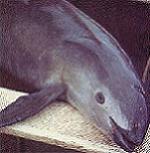 Expedition to save world's rarest cetacean threatened by lack of funding
Expedition to save world's rarest cetacean threatened by lack of funding
(02/11/2010) Little known beyond the waters of the Gulf of California, the world's smallest cetacean (a group including whales, dolphins, and porpoises) is hanging on by a thread. The vaquita—which in Spanish means 'little cow'—has recently gained the dubious distinction of not only being the world's smallest cetacean, but the also the world's rarest. In 2006 it was announced that the Yangtze river dolphin, or baiji, was likely extinct, and conservationists fear the Critically Endangered 'little cow' is next. An expedition for this year is set to identify vaquita individuals, but even this is threatened by lack of funding.
Chinese farming practices are acidifying soils
(02/11/2010) A new study in Science shows that farming practices in China are acidifying the nation's soils and threatening long term productivity at a time when food concerns worldwide have never been higher. The culprit is the increasing use of nitrogen fertilizer.
Video: Sunda clouded leopard caught on film for the first time
(02/10/2010) Carnivore researchers have captured the first footage of the Sunda clouded leopard (Neofelis diardi) in Malaysia. The island's largest predator was only proclaimed a unique species in 2006 when genetic evidence and analysis of its markings proved it was distinct enough from its mainland relative—the clouded leopard (Neofelis nebulosa)—to be considered a new species. The recent classification has prompted renewed interest in this elusive and threatened cat.
Desertification threatens 38 percent of the world
(02/10/2010) Over one third of the world's land surface (38 percent) is threatened with desertification, according to a new study published in theInternational Journal of Life Cycle Assessment. The study found that eight of fifteen eco-regions are threatened by desertification, including coastal areas, the prairies, the Mediterranean region, the savannah, the temperate steppes, the temperate deserts, tropical and subtropical steppes, and the tropical and subtropical deserts.
Companies disclose deforestation risk in their supply chains
(02/10/2010) An initiative that aims to root out deforestation by increasing the transparency of global supply chains released the results of its first survey on Wednesday, finding that most companies were not previously looking at the issue. Of 217 companies contacted by the Forest Footprint Disclosure project, only 35 responded with full data disclosure, including British Airways, BMW, Travis Perkins, L’Oréal, Weyerhaeuser, Kingfisher, Adidas, Nike, Mondi Marks & Spencer, Sainsbury's, and Unilever.
China is polluted: first national survey paints disturbing picture
(02/09/2010) The first ever national survey of pollution in China shows a nation that has paid for its economic growth in environmental pollution.
Canada creates massive new park in the boreal
(02/09/2010) Last Friday, the government of Canada and the governments of the provinces of Newfoundland and Labrador signed a memorandum of understanding to create a the new Mealy Mountains National Park. Larger than Yellowstone National Park, the new Canadian park will span 11,000 square kilometers making it the largest protected area in Eastern Canada.
First footage captured of giant sea serpent of the deep: the oarfish
(02/09/2010) Scientists have captured what they believe to be the first footage ever of the oarfish, the species likely responsible for legends told of sea serpents.
 Forgotten Species: the fiery Luristan Newt
Forgotten Species: the fiery Luristan Newt
(02/08/2010) The salamander was a mythical creature before it was a real one: the word salamander means a legendary lizard that both survived-in and could extinguish fire. A creature that the Ancient Greeks, including Aristotle, appeared to readily believe in. No one knows how the term salamander transferred from a mythical fire-dwelling monster to the small amphibious animals it applies to today, but I have a theory. Perhaps the sight of salamanders like Luristan newt—charcoal-black and flame-orange—caused people in the seventeenth century to lend the name of myth to the taxa.
 Madagascar site for kids now available in Hindi
Madagascar site for kids now available in Hindi
(02/08/2010) The Madagascar site for for kids is now available in Hindi thanks to Kaurwakki Gautam. The site is also available in Chinese, German, Spanish, French, Croatian, Slovak, Farsi, Brazilian Portuguese, Russianand Ukrainian. The rainforest site for kids is available in more than 30 languages.
 Amazon rainforest will bear cost of biofuel policies in Brazil
Amazon rainforest will bear cost of biofuel policies in Brazil
(02/08/2010) Business-as-usual agricultural expansion to meet biofuel production targets for 2020 will take a heavy toll on Brazil's Amazon rainforest in coming years, undermining the potential emissions savings of transitioning from fossil fuels to biofuels, warns a new paper published in the Proceedings of the National Academy of Sciences (PNAS). The research suggests that intensification of cattle ranching, combined with efforts to promote high-yielding oil crops like oil palm could lessen forecast greenhouse gas emissions from indirect land use in the region.
New spiny pocket mouse discovered in the mountainous rainforests of Venezuela
(02/08/2010) Researchers have discovered a new species of spiny mouse that lives on four mountainous forests in the Cordillera de la Costa mountain range of Venezuela.
Asia's biggest logging company accused of bribery, violence in Papua New Guinea
(02/08/2010) A local organization in Papua New Guinea, known as Asples Madang, is fighting against one of the region's biggest industrial loggers, Rimbunan Hijau (RH) chaired by billionaire Tiong Hiew King. Aspeles Madang has accused Malaysian company, RH, of acquiring land illegally and of using brute force and bribery in its dealing with locals.
Google Earth boosts deforestation monitoring capabilities
(02/07/2010) Google has taken a step towards ramping up the deforestation monitoring capabilities the Google Earth Engine by contracting Massachusetts-based Clark Labs to develop an online version of its Land Change Modeler application.
86 percent of dolphins and whales threatened by fishing nets
(02/07/2010) A new report from the United Nations Environment Program (UNEP) finds that almost 9 out of 10 toothed whales—including dolphins and porpoises—are threatened by entanglement and subsequent drowning from large-scale fishing operations equipment, such as gillnets, traps, longlines, and trawls. These operations threaten the highest percentage (86 percent) of the world's toothed whales.
 Forest conservation via REDD may be ineffective without addressing commodity consumption, trade
Forest conservation via REDD may be ineffective without addressing commodity consumption, trade
(02/07/2010) Deforestation is increasingly correlated to urban population growth and trade rather than rural poverty, suggesting that measures proposed to reduce deforestation will be ineffective if they fail to address demand for commodities produced on forest lands, argues a new paper published in Nature GeoScience.
Certified palm oil sales accelerate
(02/05/2010) For the first time, sales of certified sustainable palm oil have nearly met production, reports the Roundtable on Sustainable Palm Oil (RSPO), a group that has developed the leading environmental certification standard for palm oil.
 EU: rainforests can be converted to palm oil plantations for biofuel production
EU: rainforests can be converted to palm oil plantations for biofuel production
(02/04/2010) The European Union may be planning to classify oil palm plantations as forests, raising fears among environmental groups of expanded conversion of tropical rainforests for biofuel production, reports the EUobserver, which cites a leaked document from the European Commission. The draft document shows that policymakers are considering language that would specifically allow use of biofuels produced via conversion of rainforests to oil palm plantations.
Birder captures first footage ever of long whiskered owlet, one of the world's rarest birds
(02/04/2010) It was any birders dream come true: not only to see one of the world's rarest birds, but to discover a new unknown population. Israeli birder, Shachar Alterman, was surveying birds with the UK organization Neotropical Primate Conservation in Peruvian cloud forest when he heard and then saw the long whiskered owlet.
Sophisticated flying methods allow insects to hitchhike on fast winds
(02/04/2010) Researchers have long been fascinated by how insects migrate thousands of kilometers, for example from Britain to the Mediterranean. A new study, published in Science shows that although tiny, insects are not at the mercy of winds as expected. Instead they employ sophisticated flight behaviors to use fast winds to their advantage.
Extinct: last of the Andaman tribe dies
(02/04/2010) Boa Sr, the last speaker of ‘Bo’, one of the ten Great Andamanese languages, died last week, according to Survival International. She was 85.
 The Amazongate fiasco
The Amazongate fiasco
(02/03/2010) A claim published in the Sunday Times over the veracity of a statement published in an Intergovernmental Panel on Climate Change (IPCC) report may land the British newspaper in hot water. On Sunday, Jonathan Leake, Science & Environment Editor of the Sunday Times, accused the IPCC of making a "bogus rainforest claim" when it cited a report warning that up to 40 percent of the Amazon could be "drastically" affected by climate change. Climate change skeptics immediately seized on "Amazongate" as further evidence to discredit the IPCC just two weeks after it was found to be using shoddy glacier data in its 2007 climate assessment.
 Rainforest expert agrees with IPCC: warns of 'tipping point' for Amazon
Rainforest expert agrees with IPCC: warns of 'tipping point' for Amazon
(02/03/2010) Amid questions over the Amazon forests' capacity to survive climate change, a renowned tropical biologist says that in fact the fears are real, reports Tierramerica. Speaking at the Biodiversity Science Policy Conference in Paris, Thomas Lovejoy, biodiversity chair at the Washington DC-based Heinz Center for Science, Economics and the Environment, and chief biodiversity adviser to the president of the World Bank, described the Amazon rainforest as "very close to a tipping point".
NASA: Arctic melt season lengthening
(02/03/2010) Newly released images from NASA and the National Snow and Ice Data Center show that the Arctic's melt season has lengthened significantly over the past few decades.
 Could special bonds fund the green revolution and stabilize the climate?
Could special bonds fund the green revolution and stabilize the climate?
(02/02/2010) There is no question that governments around the world are moving slowly and sluggishly to combat climate change, especially when placed against the measures recommended by climate scientists. Only a handful of nations have actually cut overall greenhouse gas emissions, and the past couple decades have seen emissions rise rapidly worldwide as nations like India and China industrialize while Brazil and Indonesia continue massive deforestation. Global temperatures are rising in concert (though with natural fluctuations): the past decade is the warmest on record. After the failure of Copenhagen this past December to produce an ambitious and binding treaty, many are wondering if the world will ever address the threat of climate change or if future generations are set to live in a world far different—and more volatile—than the one we currently enjoy.
Pet dealer won't regain custody of 26,000 animals seized during raid
(02/02/2010) U.S. Global Exotics, an exotic pet dealer accused of animal cruelty and linked with a notorious wildlife smuggler based in Malaysia, will not be getting back of the 26,000 animals seized from their facility during a raid on December 15th, reports the Star-Telegram.
Bronx Zoo puts 'extinct' frogs on display
(02/02/2010) The Bronx Zoo has a put a most unusual frog on display: the Kihansi spray toad. For one thing, the Kihansi spray toad survived on only 5 acres in the Kihansi gorge in Tanzania, adapted to the areas' unique and constant mist from the gorge and a waterfall. For another, female Kihansi spray toads give birth to live young, instead of laying eggs. Finally, the Kihansi spray toad is extinct—at least in the wild.
On World Wetland's Day bad news for America's iconic ducks
(02/02/2010) World Wetland Day 2010 brings with it new research on America's prairie wetlands and bad news for the country's waterfowl. A new study in BioScience finds that America's prairies are greatly susceptible to climate change: a warmer and drier prairie will desiccate wetlands needed by ducks and other waterfowl for food, shelter, and breeding.
Environmentalists and indigenous groups decry approval of massive dam in Amazon
(02/02/2010) The approval of the hydro-electric Belo Monte Dam from the Brazilian environmental agency, IBAMA, has raised condemnations from environmentalists and indigenous groups. The dam will divert the flow of the Xingu River, a tributary of the Amazon River, which runs through the Amazon in northeast Brazil. According to critics the dam will destroy vast areas of pristine rainforest, disrupt sensitive ecosystems, and relocate 12,000 people.
Half of Indonesia's species remain unknown
(02/02/2010) Incorporating 17,000 tropical islands, Indonesia is one of the world's richest areas of biodiversity. However, according to the Jakarta Post, over half of this biodiversity remains unrecorded with only 20 of the more than 400 regencies in the country recording species.
Jumbo squid explosion
(02/02/2010) Jumbo squid are back in the waters of Southern California and anglers are seeing an uptick in business, reports the Los Angeles Times.
 The secret life of a Californian pest
The secret life of a Californian pest
(02/01/2010) The acorn woodpecker is best known for its chortle, which may have inspired Woody the Woodpecker's iconic laugh. But many California residents say there's nothing funny about the hundreds of holes these birds leave outside of homes and businesses while storing acorns for the winter. In early 2009, two housing associations in the retirement community of Rossmoor found themselves at the heart of a national scandal after obtaining a depredation permit to shoot the winged vandals, according to the Los Angeles Times. But researchers on the Hastings Natural History Reserve in Carmel Valley don't see acorn woodpeckers as pests. For more than 40 years, biologists here have studied the ecological soap operas underlying acorn woodpecker social groups to learn why animals choose to cooperate in some situations and not in others.
Most popular mongabay news articles in January
(02/01/2010) Jeremy Hance's look at real-life examples of indigenous struggles against corporate interests, using the blockbuster Avatar as a backdrop, wins in a landslide.
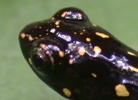 Photos: New tropical frog undergoes remarkable transformation
Photos: New tropical frog undergoes remarkable transformation
(02/01/2010) Nature never runs out of surprises. Exploring Sudest Island off of Papua New Guinea, researchers discovered a new species of frog that drastically changes its appearance from juvenile to adulthood, a transformation that has never been seen in another frog.The new species, named Oreophryne ezra, is shiny black with bright yellow spots. Yet when it matures, the frog becomes rose-colored and even its eyes change from black to blue.
China leaves US (and Europe) in the dust on renewable energy
(02/01/2010) This year China has become the world's largest manufacturer of solar panels and wind turbines, doubling its wind capacity since 2005. The economically booming nation—and the world's most populous—has also invested heavily in nuclear power and the world's most efficient coal plants, according to the New York Times.
Russian police raid environmental group working to protect Lake Baikal
(02/01/2010) Russian police have raided the Baikal Environmental Wave organization reports the Moscow Times. Police seized several computers, citing the reason for the raid to uncover the use of unlicensed software.
UK failing to meet biofuel sustainability standard
(02/01/2010) Only 4 percent of biofuel imported for use in the UK meets the environmental sustainability standard set by the Renewable Transport Fuel Obligation (RFTO), reports a new assessment from the Renewable Fuels Agency.

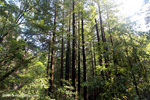
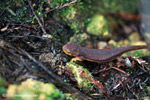
 How that cork in your wine bottle helps forests and biodiversity, an interview with Patrick Spencer
How that cork in your wine bottle helps forests and biodiversity, an interview with Patrick Spencer James Inhofe is not a climatologist: a journalist's perspective
James Inhofe is not a climatologist: a journalist's perspective  Even megafauna can be quickly forgotten: the baiji and shifting baselines
Even megafauna can be quickly forgotten: the baiji and shifting baselines Where two worlds collide: visiting Tabin Wildlife Reserve
Where two worlds collide: visiting Tabin Wildlife Reserve The Critically Endangered South China Tiger Roars Again in 2010, the Chinese Year of the Tiger
The Critically Endangered South China Tiger Roars Again in 2010, the Chinese Year of the Tiger A proposal to end Madagascar's logging crisis
A proposal to end Madagascar's logging crisis Forest conservation in U.S. climate policy: an interview with Jeff Horowitz
Forest conservation in U.S. climate policy: an interview with Jeff Horowitz Why top predators matter: an in-depth look at new research
Why top predators matter: an in-depth look at new research Tales From A Frozen Zoo
Tales From A Frozen Zoo Stopping wildlife trafficking in Congo
Stopping wildlife trafficking in Congo Guyana bans gold mining in the 'Land of the Giants'
Guyana bans gold mining in the 'Land of the Giants' French company prepares to ship illegally logged rainforest wood from Madagascar
French company prepares to ship illegally logged rainforest wood from Madagascar Grizzly bears move into polar bear territory, threatening polar cubs
Grizzly bears move into polar bear territory, threatening polar cubs Vietnam implements project to save one of the world's rarest mammals, the shy soala
Vietnam implements project to save one of the world's rarest mammals, the shy soala Pregnancy gives new hope for rhino on the brink
Pregnancy gives new hope for rhino on the brink  Photos: highest diversity of cats in the world discovered in threatened forest of India
Photos: highest diversity of cats in the world discovered in threatened forest of India Humans push half of the world's primates toward extinction, lemurs in particular trouble
Humans push half of the world's primates toward extinction, lemurs in particular trouble New study: why plants produce different sized seeds
New study: why plants produce different sized seeds Under siege: oil and gas concessions cover 41 percent of the Peruvian Amazon
Under siege: oil and gas concessions cover 41 percent of the Peruvian Amazon  Twelve-year-old on a mission to save Africa's most unusual animal, the okapi, an interview with Spencer Tait
Twelve-year-old on a mission to save Africa's most unusual animal, the okapi, an interview with Spencer Tait  How free trade has devastated Africa's farmers and poor
How free trade has devastated Africa's farmers and poor


 Expedition to save world's rarest cetacean threatened by lack of funding
Expedition to save world's rarest cetacean threatened by lack of funding Forgotten Species: the fiery Luristan Newt
Forgotten Species: the fiery Luristan Newt  Madagascar site for kids now available in Hindi
Madagascar site for kids now available in Hindi Amazon rainforest will bear cost of biofuel policies in Brazil
Amazon rainforest will bear cost of biofuel policies in Brazil Forest conservation via REDD may be ineffective without addressing commodity consumption, trade
Forest conservation via REDD may be ineffective without addressing commodity consumption, trade EU: rainforests can be converted to palm oil plantations for biofuel production
EU: rainforests can be converted to palm oil plantations for biofuel production The Amazongate fiasco
The Amazongate fiasco Rainforest expert agrees with IPCC: warns of 'tipping point' for Amazon
Rainforest expert agrees with IPCC: warns of 'tipping point' for Amazon  The secret life of a Californian pest
The secret life of a Californian pest Photos: New tropical frog undergoes remarkable transformation
Photos: New tropical frog undergoes remarkable transformation